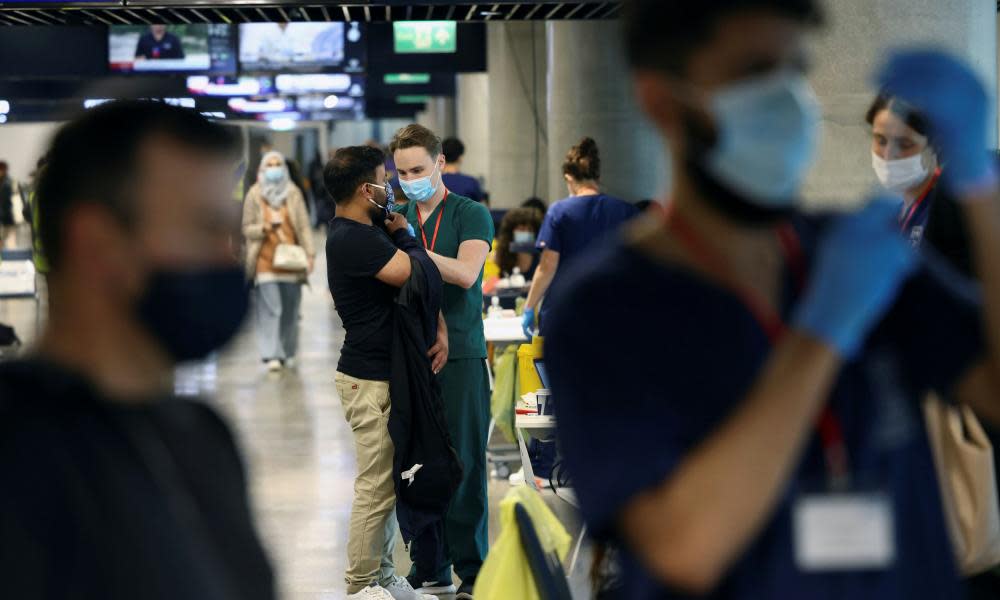Flu could be ‘bigger problem than Covid in UK this winter’

Flu could be a bigger problem than Covid-19 in the UK this winter, a senior government vaccine adviser has said, with low prevalence over the past months possibly leading to a drop in immunity among the population.
Prof Anthony Harnden, the deputy chair of the Joint Committee on Vaccination and Immunisation, said research was being carried out on whether flu vaccines could be given alongside coronavirus vaccines this autumn.
“I will emphasise that actually flu could be potentially a bigger problem this winter than Covid,” Harnden told BBC Radio 4’s Today programme.
“We’ve had a very, very low prevalence of flu for the last few years, particularly virtually nil during lockdown, and we do know that when flu has been circulating in very low numbers immunity drops in the population, and it comes back to bite us. So flu can be really, really important this winter.”
Harnden made his comments during a discussion of the need to plan for ongoing Covid vaccinations in order to ensure infrastructure is in place to provide booster doses before any potential new pandemic wave this winter.
In a statement, Chris Hopson, the chief executive of NHS Providers, and Martin Marshall, the chair of the Royal College of GPs, described the 19 July target to provide first doses to all adults as a “staging post”.
“We will have to live with the Covid virus for a long time to come, building a long-term set of defences, as we’ve done with influenza,” Hopson and Marshall wrote. “This will require a sustainable approach to Covid vaccination. One that enables the GPs and trusts we represent to carry on vaccinating whilst meeting the other pressures they face.”
default
The statement posed a number of questions, including how long immunity from the initial double dose of Covid vaccines lasts; whether if booster shots are needed it will be possible to give different vaccines to those initially administered; how vaccines altered to address new virus variants could be incorporated; and whether flu and Covid vaccination campaigns can be safely combined.
“We wouldn’t be able to start any booster or re-vaccination campaign until these questions have been answered,” Hopson and Marshall added. “Science will help determine who gets what, and when. But with the flu campaign due to start in September, decisions will soon be needed.”
Speaking on Today, Marshall said: “We do need to dig into what a [vaccine] programme would look like for an endemic condition, when we’re outside the crisis mode that we’ve been in for the past six months. We do need to know, first of all, whether a booster vaccination programme is needed. Who will need it? We need to know where it will be given and by whom.
“In general practice, for example, where three-quarters of the vaccines have been given, our GPs and nurses are exceptionally busy. Is it possible that a booster campaign can be given by non-clinical trained vaccination staff?”
He added that general practices administered large flu campaigns in the winter and asked whether it would be possible to give a Covid-19 jab at the same time, as “clearly that would be a very efficient process”.
Last week Boris Johnson said the government would soon set out plans for a booster vaccination programme. Results of initial research into which vaccines might be most useful for the job are expected in September.
The Department of Health and Social Care said: “As the public would expect, the government is continuing to plan for a booster programme later in the year. Final decisions on what any booster programme would look like will ultimately depend on the data from ongoing clinical trials, such as the Cov-Boost trial, and the independent advice from the medical experts at the Joint Committee on Vaccination and Immunisation (JCVI).
“We are making phenomenal progress with the vaccination rollout and all adults aged 18 and over in England are now being offered a first dose, with every adult across the UK set to be offered a first dose by 19 July.”

 Yahoo Movies
Yahoo Movies 
